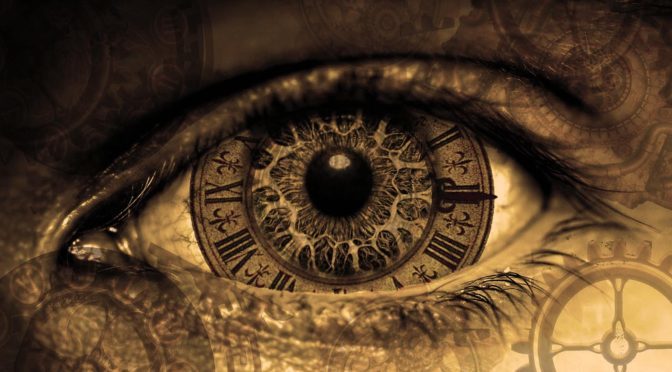“The past, like the future, is indefinite and exists only as a spectrum of possibilities.”
– Stephen Hawking
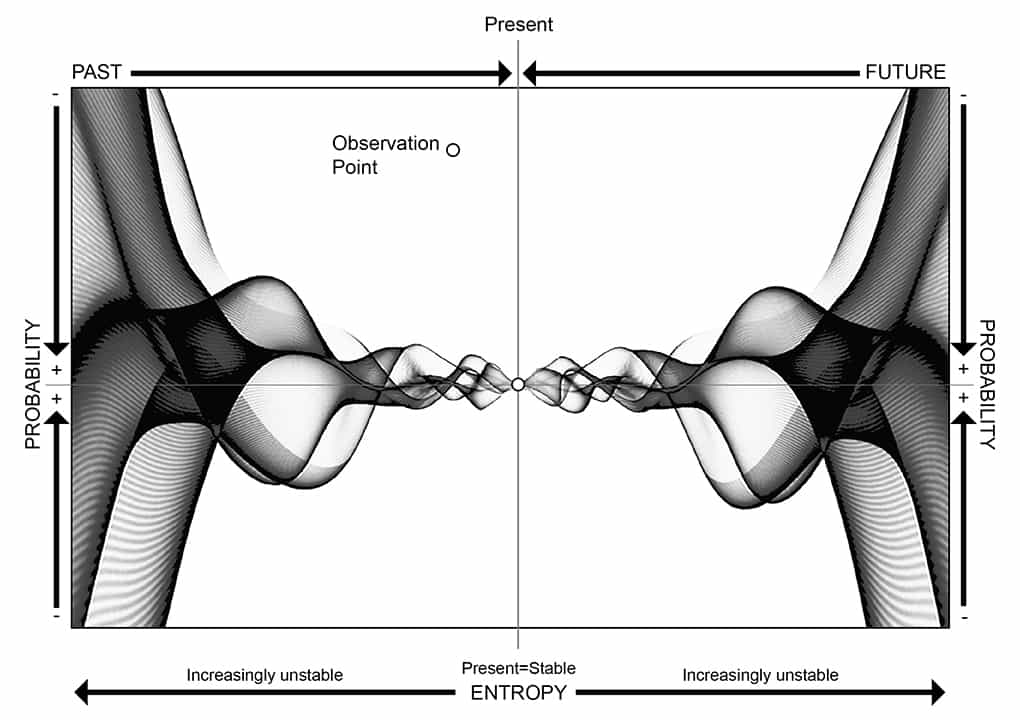
On the Constant Present and Variable Future Past
– Past Imperfect and Imprecise Future
by Dr. Mark David Major, AICP, CNU-A
Time is a universal constant, according to my understanding of the science. By universal constant, it means that time flows at a constant rate — much like the speed of light is 186,282 miles/sec — everywhere in the universe. Of course, the exception is if one travels at or near the speed of light, then time slows down for the traveler while time flows at its constant rate for the non-traveler based on Einstein’s theory of relativity. This is not a deterrent to the ideas in this post. For example, my understanding is Newton’s universal laws do not apply at the quantum level of our universe yet they are still applicable as scientific laws.
The premise of the ‘multiverse’ has gained greater acceptance in the scientific community over the last three decades. In the realm of science fiction, this idea has been around much longer; more than a century if we consider H.G. Wells’ The Time Machine (1895) as the starting point. In terms of time, the concept of the multiverse imagines that every scenario of events/actions in nature (including those specifically human) are played out across an infinite number of dimensions (perhaps portrayed most famously in Star Trek beginning in the 1967 episodes “Mirror, Mirror” and “The City on the Edge of Forever”, which used this premise for dramatic purposes). 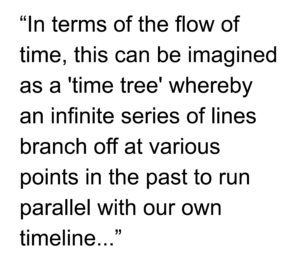 In terms of the flow of time, this can be imagined as a ‘time tree’ whereby an infinite series of lines branch off at various points in the past to run parallel with our own time line, like the branches of a tree where the root of the trunk is the Big Bang and the dimensions of ‘multiverse’ diverge from this earliest point in time. You can also refer to Doc Brown’s simplistic chalk board drawing and explanation to Marty in Back to the Future II). It is a tantalizing concept. However, Einstein’s theories tell us that time travel is not possible; or, at least, it is accepted that time travel to the past is not possible (the future, maybe, according to some physicists). The usual shorthand for this is the ‘grandfather paradox’, which is if I travel to the past and kill my grandfather then I never existed to travel to the past and kill my grandfather, i.e. a temporal paradox.
In terms of the flow of time, this can be imagined as a ‘time tree’ whereby an infinite series of lines branch off at various points in the past to run parallel with our own time line, like the branches of a tree where the root of the trunk is the Big Bang and the dimensions of ‘multiverse’ diverge from this earliest point in time. You can also refer to Doc Brown’s simplistic chalk board drawing and explanation to Marty in Back to the Future II). It is a tantalizing concept. However, Einstein’s theories tell us that time travel is not possible; or, at least, it is accepted that time travel to the past is not possible (the future, maybe, according to some physicists). The usual shorthand for this is the ‘grandfather paradox’, which is if I travel to the past and kill my grandfather then I never existed to travel to the past and kill my grandfather, i.e. a temporal paradox.
But what if this premise of time is inaccurate? What are the implications if we invert our ‘time tree’ and anchor the root to the present? The future and the past become “a spectrum of possibilities” (or probabilities) whereby the past converges on the present and diverges into the future. In this sense, time flows at a constant rate but is fluid. NOTE: After later reading an article about time by a philosopher of science in England, we can add the concept of entropy to this picture; namely, entropy is only stable in the present and becomes increasingly unstable in both the past and the future (6 September 2017 revision).
This means the past, present and future are always changing based on the probability of small moments (decisions, actions, events) across time, and time itself is overlapping waves of probabilities anchored to the present. We do not perceive this because we are always trapped in this particular point of time-space that we call the present. We could only observe the fluctuating waves of time and history if we could simultaneously exist in the present and ‘outside’ of that point in time; in the same manner that Einstein explained the theory of relativity from the point of view of the observer and the observed traveling at the speed of light.
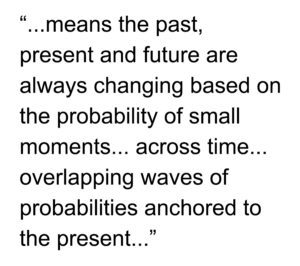 The past only ‘appears’ fixed to us but the probabilities of the past (some probable, others unlikely) are always altering our perception of the present, just as we do the same for an infinite number of probable futures. For example, according to the Wikipedia entry on the Holocaust, the Nazis exterminated approximately 11 million (nearly 7.25 million Jews) between 1941 and 1945. Note: This example is not intended to be controversial but merely illustrative in gross, easily understood terms. I understand this Wikipedia said the same thing yesterday and believe it will say the same tomorrow but only because I am anchored in the present, which defines my perception of yesterday and tomorrow. But if the past is a series of probabilities constantly changing the present, then it is possible this Wikipedia entry stated yesterday/tomorrow it was/is 10 million or 12 million. The lowest probability outcome would be that the Wikipedia entry will state/did stated tomorrow/yesterday that the Nazis exterminated the entire Jewish race or the Nazis didn’t exterminate anyone (or even existed). Without being able to observe time from outside its flow, I can never be certain.
The past only ‘appears’ fixed to us but the probabilities of the past (some probable, others unlikely) are always altering our perception of the present, just as we do the same for an infinite number of probable futures. For example, according to the Wikipedia entry on the Holocaust, the Nazis exterminated approximately 11 million (nearly 7.25 million Jews) between 1941 and 1945. Note: This example is not intended to be controversial but merely illustrative in gross, easily understood terms. I understand this Wikipedia said the same thing yesterday and believe it will say the same tomorrow but only because I am anchored in the present, which defines my perception of yesterday and tomorrow. But if the past is a series of probabilities constantly changing the present, then it is possible this Wikipedia entry stated yesterday/tomorrow it was/is 10 million or 12 million. The lowest probability outcome would be that the Wikipedia entry will state/did stated tomorrow/yesterday that the Nazis exterminated the entire Jewish race or the Nazis didn’t exterminate anyone (or even existed). Without being able to observe time from outside its flow, I can never be certain.
Our actions in the past, present, and future continually shape history within an infinite set of probabilities measuring from unlikely (-) to likely (+). At the same time, time tends to converge on the highest probabilities in giving shape to the present, just as our actions in the present (in small ways at this specific point in time) give shape to the probable outcomes of the future. This is free will as measured in our actions; past, present, and future in giving shape to what was, what is, and what will be. However, there is also a balance to time in the universe as it tends to converge on the highest probabilities. This is not predestination but what we could term ‘pre-probabilistic’. In nature, it takes a dramatic event to change the probabilities; for example, the Cretaceous–Paleogene (K–Pg) extinction event caused by an asteroid impact that led to the extinction of the dinosaurs. In human history, altering the probabilities is more easily achieved (if that is the right word) at the level of the collective; for example the Black Death pandemic from 1346–53 that killed somewhere between 75 and 200 million people in Europe. It takes a rare individual to alter the probabilities of history. For example, Alexander the Great directly gave rise to the Hellenistic Period. It is probable that the influence of Greek culture on the Roman Republic/Empire (and later on European and American models of representative government) still would have occurred but, absence Alexander’s ambitions for conquest, Philip I of Macedon or some other’s Greek’s ambitions would have been limited to Greece itself/Greek cities of Asia Minor and Darius III’s Persian Empire probably does not fall, which trickles down to affect the probabilities that eventually converge on the present. In fact, based on this concept of time, such people (Alexander the Great, Julius Caesar, Napoleon, Hitler, and so forth) do not ‘fulfill’ their destiny but overcome their destiny to profoundly alter the probabilities of times. It seems likely this happens all the time on a smaller, imperceptible scale for some people.
This concept of time appears to ‘fit’ well with Einstein’s ideas that time travel is not possible. Perhaps, though, it would be more accurate to state that if you did time travel, you could never certain of arriving in the most probable past or future that defines the nature of your present. First, you would have to locate, observe and map the probabilities of the past and future from outside of time-space itself. 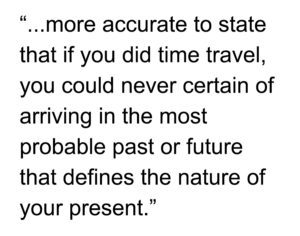 This is as good as a definition of the omnipotent as any, i.e. God. Second, this would be mathematically impossible since the probabilities from every event/action in history would be infinite. Perhaps it would be feasible in some manner to ‘random sample’ the probabilities by first mapping the least probable extremes (Nazis never existed, Nazis conquered the world) and work towards the most probable (Nazis exterminated 10.9 or 11.1 million people during the Holocaust). However, even this is a daunting task because how could you determine and map the extremes of lowest probability in an infinite set? It cannot be done except in a partial, incomplete manner. At least, not without taking some mathematical shortcuts, i.e. cheats. This always brings you back to an uncertainty principle in time travel. You could never be certain of arriving in the right place or time because the only ‘anchor’ is the present.
This is as good as a definition of the omnipotent as any, i.e. God. Second, this would be mathematically impossible since the probabilities from every event/action in history would be infinite. Perhaps it would be feasible in some manner to ‘random sample’ the probabilities by first mapping the least probable extremes (Nazis never existed, Nazis conquered the world) and work towards the most probable (Nazis exterminated 10.9 or 11.1 million people during the Holocaust). However, even this is a daunting task because how could you determine and map the extremes of lowest probability in an infinite set? It cannot be done except in a partial, incomplete manner. At least, not without taking some mathematical shortcuts, i.e. cheats. This always brings you back to an uncertainty principle in time travel. You could never be certain of arriving in the right place or time because the only ‘anchor’ is the present.
There is something comforting in this concept of time because our actions do matter but, at the same time, time in the universe develops a ‘self-correcting’ mechanism based on the laws of entropy and probability whereby time tends to converge on those possibilities with the greatest likelihood. If I travel back in time and kill my grandfather, then my ‘grandmother’ marries my grandfather’s brother (greatest chance is my grandmother marries someone most similar to my grandfather). I still exist as a slightly modified version of myself derived from the same gene pool to travel back in time and kill my now-great uncle. We can change the future and the past is always changing us but only through tremendous efforts in altering the parameters in probability do we make certain outcomes more or less probable. It also means there is only one ‘now’ – carpe diem.
On Space is a regular series of philosophical posts from The Outlaw Urbanist. These short articles (usually about 500 words) are in draft form so ideas, suggestions, thoughts and constructive criticism are welcome.

